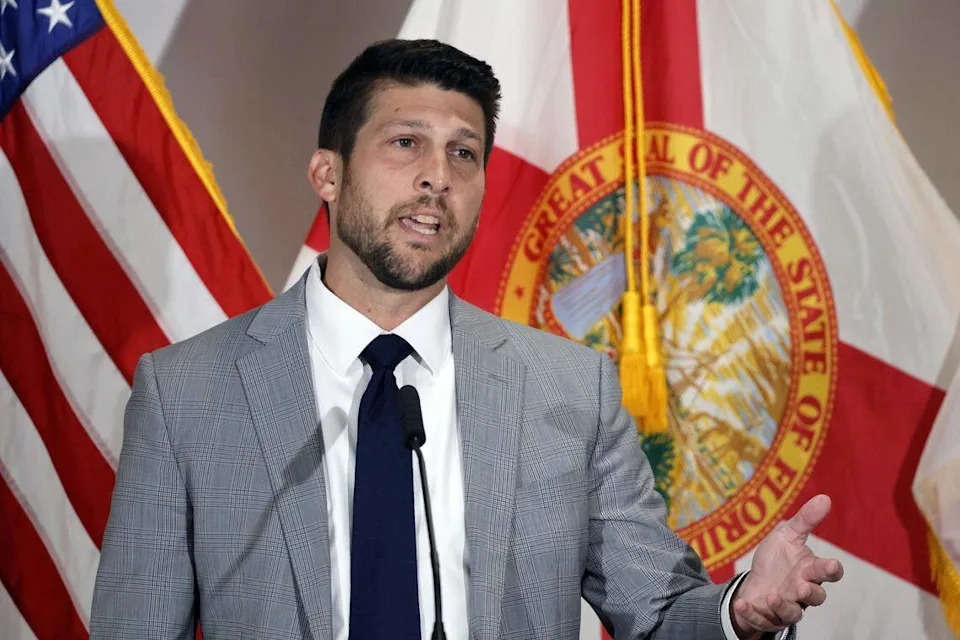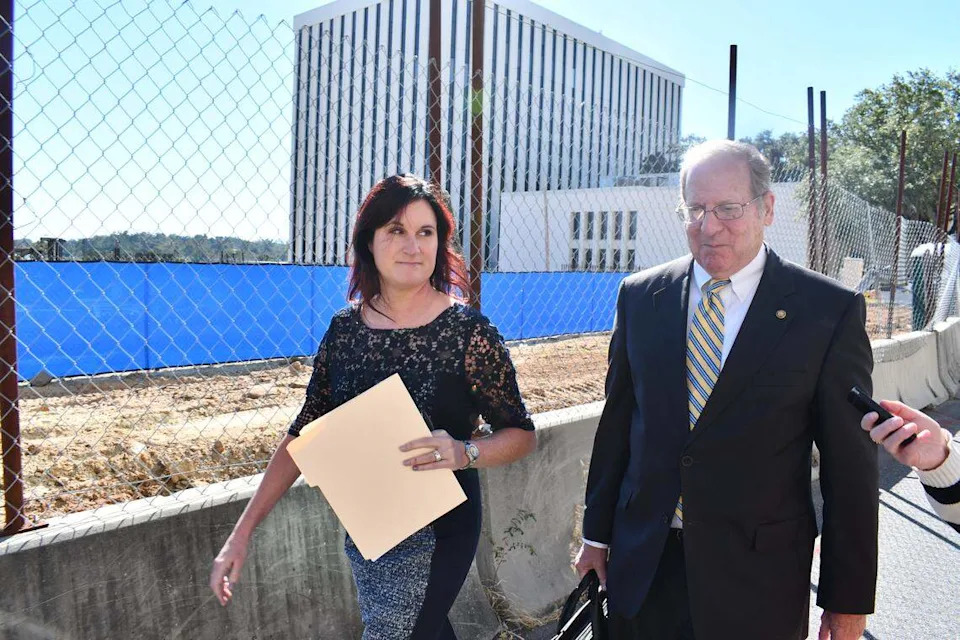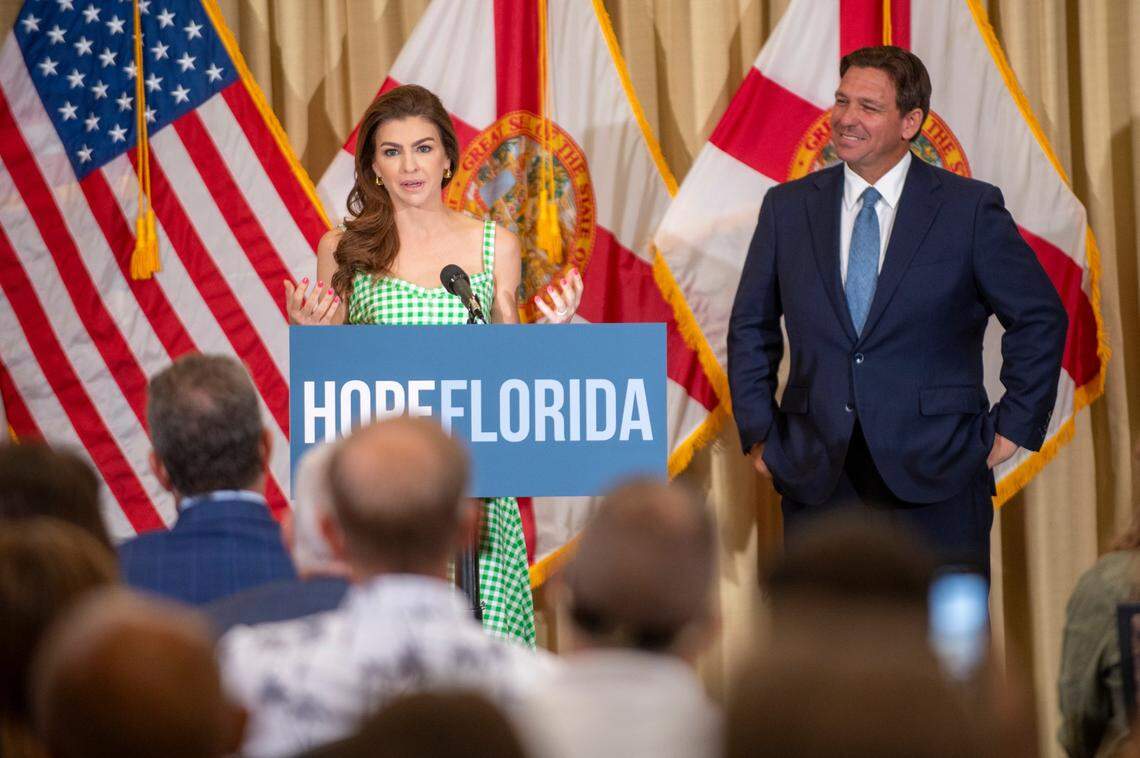A grand jury convened in Tallahassee this week for at least two days of testimony relating to the Hope Florida Foundation, the embattled charity created by Gov. Ron DeSantis’ administration.
The grand jury could issue criminal indictments and get answers to crucial questions in a scandal that has dominated state politics this year.
Lawmakers have alleged that the DeSantis administration took $10 million from a state Medicaid legal settlement and funneled it through the foundation for political purposes: defeating a recreational marijuana ballot initiative.
DeSantis and his top officials have denied wrongdoing, but they also haven’t answered key questions about how everything went down.

Attorney General James Uthmeier speaks during a news conference at Palm Beach State College in Lake Worth on Wednesday, Aug. 20, 2025. (Amy Beth Bennett / South Florida Sun Sentinel)
Whose idea was it?
No one has taken responsibility for directing Medicaid contractor Centene to give $10 million of a $67 million legal settlement to the Hope Florida Foundation and routing the money to nonprofits, which gave nearly all of it to a political committee.
Records show the idea of a donation first appeared in settlement talks with Centene in September last year, two years after lawyers first approached Florida officials about a $67 million settlement with the company.
The Agency for Health Care Administration’s general counsel rewrote a settlement draft to include a donation to the foundation and sent it to the agency’s then-secretary, Jason Weida. The change was “per our discussion,” the general counsel wrote. Weida is now DeSantis’ chief of staff.
The change came a day after agency officials were scheduled to meet with the governor’s office, records show.
DeSantis’ then-chief of staff, James Uthmeier, was involved in nearly every step. He was in the early settlement talks with Centene, records show. (He said he was not involved in the later talks.)
Uthmeier, who is now Florida’s attorney general, also oversaw DeSantis’ campaign against Amendment 3 on recreational marijuana. After the Centene settlement was finalized, he told the executive director of one of the nonprofits to ask the Hope Florida Foundation for the money, according to Republican Rep. Alex Andrade. He led the House committee that investigated the transactions this year.
That nonprofit then gave nearly all the money to a political committee, controlled by Uthmeier, created to fight Amendment 3.
The executive director has said Uthmeier did not tell her what to do with the money, but she has not disputed that Uthmeier told her to apply for it.
How involved were the DeSantises?
Hope Florida was first lady Casey DeSantis’ key initiative. The Hope Florida Foundation was created to support it.
Records show that both Uthmeier and DeSantis’ deputy chief of staff, Katie Strickland, who also served as Casey DeSantis’ chief of staff, were included in early settlement talks.
Casey’s name is on the ceremonial checks the charity gives churches and nonprofits.
But neither DeSantis has said what their involvement was in the diversion of the $10 million – or whether they were aware of it.
What was the $10 million ultimately spent on?
The basics are known.
The $10 million from Centene was “directed” to the Hope Florida Foundation. The foundation sent $5 million each to two politically connected nonprofits. Those nonprofits each sent a total of $4.75 million over several days to Keep Florida Clean, the political committee controlled by Uthmeiert.
From there, things get murkier.
Keep Florida Clean gave $8.5 million to the Republican Party of Florida, which was working to defeat the amendment, and another $1.1 million to DeSantis’ political committee, the Florida Freedom Fund.
Neither the party nor DeSantis has said what the money was spent on.
However, by far the Florida GOP’s biggest expenditures during the period — $46 million — were for media ad buys with one company known to be running ads against Amendment 3 and Amendment 4, which would have protected abortion access. Payments to that company accounted for nearly two-thirds of the party’s expenses during the period.
DeSantis hasn’t said whether the money from the Medicaid settlement ended up in his political account.
What, if anything, was illegal?
It’s not known what charges the state grand jury is considering, or who is being investigated. But Medicaid funds are highly regulated and owed to state and federal taxpayers.
In May, four former federal prosecutors told the Times/Herald there were eight different federal charges, from theft of government funds to money laundering, that could be investigated.
A local grand jury would investigate violations of Florida, not federal, law, however.
State Rep. Alex Andrade, the Pensacola Republican who investigated the transactions, has said Uthmeier and the attorney for the foundation, Jeff Aaron, “engaged in a conspiracy to commit money laundering and wire fraud.”
Florida has criminal statutes against money laundering, theft, and conspiracy, each of which can be felonies carrying sentences of years in prison.

Amy Ronshausen and her attorney, Ken Sukhia, after leaving the Leon County Courthouse on Tuesday, Oct. 14. Ronshausen wouldn’t answer a reporter’s question about her testimony to the grand jury in the case involving the Hope Florida Foundation.
Who is talking with the grand jury?
Only Andrade has confirmed that he spoke with the grand jury. He said he met with them for about two hours on Tuesday, but couldn’t divulge what was asked or what he said.
But other people linked to the Hope Florida Foundation were also seen at the courthouse this week.
The former president of the foundation, Joshua Hay, left the courthouse Wednesday.
Hay was on the board when it gave away half of the $10 million to a nonprofit overseen by the Florida Chamber of Commerce. He signed off on giving the other $5 million to the St. Petersburg-based nonprofit Save Our Society from Drugs.
The executive director of that nonprofit, Amy Ronshausen, entered and left the courthouse with a lawyer on Tuesday.
Neither would comment on why they were there.

